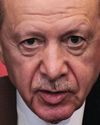
One day last fall, Volodymyr Zelensky, the President of Ukraine, came across a clip from Russian TV that had gone viral on social media. It showed one of Russia's most prominent talk-show hosts calling for Ukrainian children to be killed "thrown in a river with a strong current" for speaking out against the Russian occupation of their homeland. Even by the ugly standards of Russian warmongering, the statement seemed to cross a line, and the host soon lost his job over it. But it continued to trouble Zelensky.
"Their society accepts this, consumes it," he told me with evident disgust a few weeks later. "They live in this paradigm." The Russian invasion of Ukraine was in its ninth month at that point, long enough to harden Zelensky to many of its horrors-the bombardment of Ukrainian cities, the kidnapping of Ukrainian children, the torture and killing of civilians all of which the President addressed in our interviews with a defiant kind of stoicism. But the Kremlin's propaganda, and the hold it seems to have over many of its viewers, still got under the President's skin. "It shocks me," he said, "the force of this information, the information sickness."
Not only in Russia, but also across the occupied regions of eastern and southern Ukraine, millions of people absorb the Kremlin line about Ukraine through Russian television. Its central message, like a genocidal fever dream mixed in among gardening shows and soap operas, depicts Ukraine's existence as a historical mistake, its government a cabal of satanists and neo-Nazis intent on Russia's destruction. Zelensky, as the main villain in these narratives, does not believe their lack of subtlety makes them any less effective, and he has made it his mission not only to free Ukrainian land from Russian occupation but also to liberate Ukrainians from what he calls the "Russian information space."
This story is from the July 03, 2023 edition of Time.
Start your 7-day Magzter GOLD free trial to access thousands of curated premium stories, and 9,000+ magazines and newspapers.
Already a subscriber ? Sign In
This story is from the July 03, 2023 edition of Time.
Start your 7-day Magzter GOLD free trial to access thousands of curated premium stories, and 9,000+ magazines and newspapers.
Already a subscriber? Sign In

A timely thriller for a mad, mad world
A’70s-style paranoid thriller grounded in the partisan polarization of today

Freshwater reserves
A troubling dip

An exuberant ode to human possibility
VERY RARELY DOES THE RIGHT MOVIE ARRIVE AT precisely the right time, at a moment when compassion is in short supply and the collective human imagination has come to feel shrunken and desiccated.

Broadcasting a crisis for the world to see
ON SEPT. 5, 1972, A 32-YEAR-OLD PRODUCER NAMED Geoffrey S. Mason was working in a control room for ABC Sports in Munich while 12 hostages, including several members of the Israeli Olympic delegation, were being held in a building nearby.

The Power of the Peer
WITH MENTAL-HEALTH CARE IN SHORT SUPPLY, CAN REGULAR PEOPLE FILL THE GAP?

QUEERING THE STORY
Luca Guadagnino directs Daniel Craig in an adaptation of William S. Burroughs' 1985 novella Queer

Shopping under the influence
LTK CO-FOUNDER AMBER VENZ BOX SAW THE FUTURE OF RETAIL. IT TOOK YEARS FOR THE REST OF THE WORLD TO CATCH UP

The Kingmaker
Elon Musk's partnership with the President-elect

Turkey's Erdogan plots his next power grab
RECEP TAYYIP Erdogan is a political survivor.

Why maiden names matter in the age of AI and identity
IN THE DIGITAL AGE, A NAME IS MORE THAN JUST A label. It's tied to our professional history and social media presence.